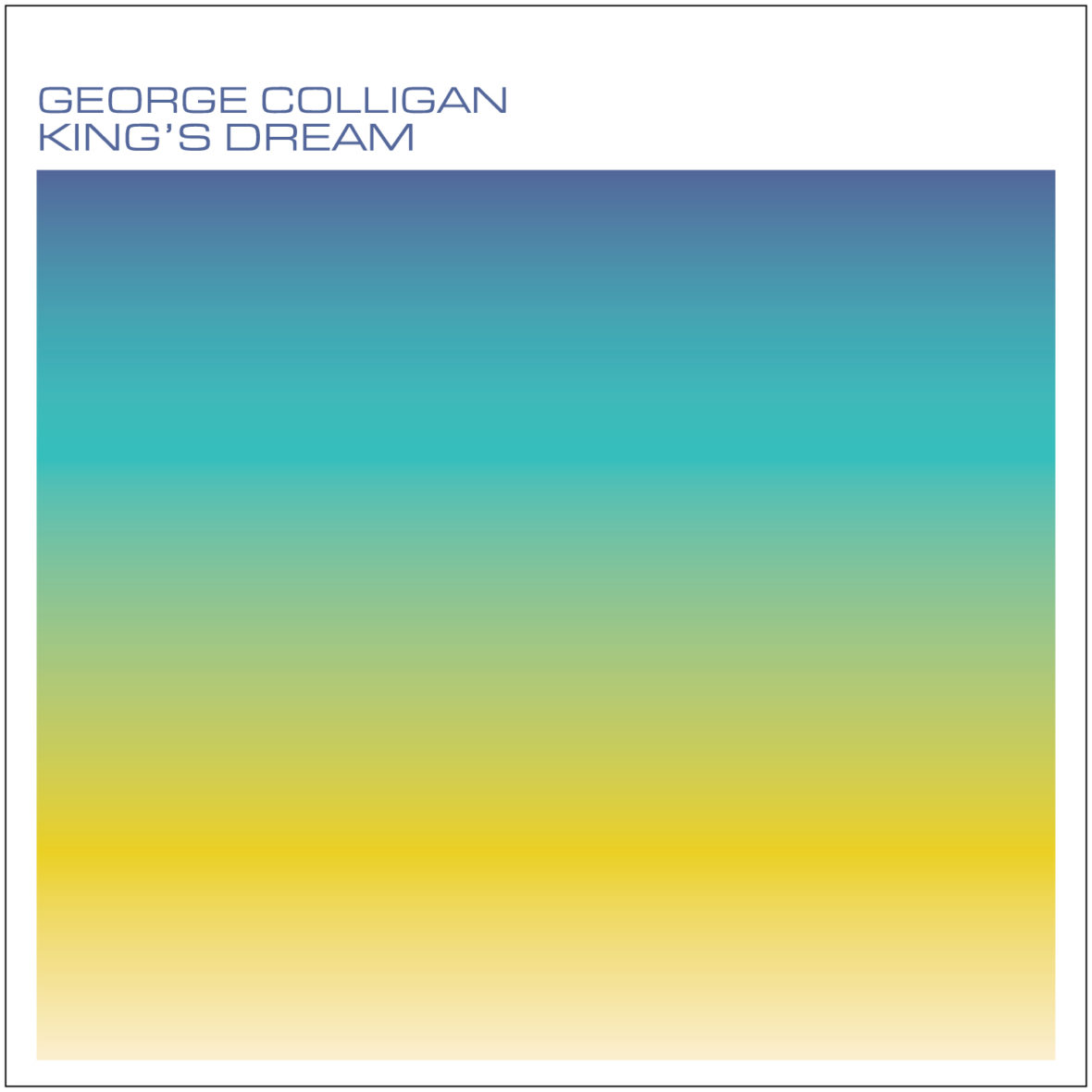
photo by Douglas Detrick
George’s Liner Notes:
I got interested in the piano mostly because I wanted to be a composer. This album is a reflection of this idea. However, it’s also a reflection of my philosophy as an improviser and a jazz musician. These performances are all first takes. I wanted to document my songs, but also exemplify my belief that perfection in music is not as important as the initial impulse and overall musical intent. As I’ve gotten older, I’ve been more interested in capturing the human and organic moments in music. With all of the technology we have now, you could spend a lot of time editing your music to the point where it’s impeccable. But is this what life is all about?
Finally, the title track of this album pertains to Dr. Martin Luther King. I grew up in a progressive liberal household in Columbia, Maryland- a planned city for which racial harmony was one of urban developer James Rouse’s goals. I was raised believing that Dr. King’s Dream had come true. We can see now that not only is his dream in question, but perhaps it was never fully realized. In this challenging era and complex world in which we live, we have to believe that good will and enlightenment will prevail over ignorance and hatred. I don’t know whether music can make a difference, but I dedicate my album to those who believe in, as drummer Al Foster would say, “ Peace, Love, and Jazz.”
George’s Bio:
Getting a handle on George Colligan isn’t an easy task. Best known as an acclaimed pianist and composer who’s played on more than 150 albums with an array of jazz legends and mid-career masters, he’s also a trumpeter, educator, bandleader, and drummer. His multifarious creative activities add up to a dauntingly complex portrait, but his new album King’s Dream distills his expressive power with elegant and instantly approachable concision. A solo piano session conceived and recorded in the midst of the pandemic, King’s Dream is inviting but introspective, a musical reflection on trying times that offers the succor of beauty without flinching from hard questions.
Recorded at engineer and fellow ace pianist Randy Porter’s Heavywood Studio, the home of a superlative Steinway Concert Grand, the project was a direct response to the anxiety, isolation, and political ferment of 2020. “It was and still is such an unusual time,” Colligan says. “Who knows what tomorrow brings? The music is a representation of that uncertainty. I’ve done a lot of different stuff over my career— singer/songwriter sessions, organ, drums—and I wanted to get back to basics a little bit. This is an album dealing with my own compositions.”
Based in Oregon for the past decade, Colligan has earned international esteem as one the most original and versatile jazz artists of his generation. Increasingly in demand as a drummer—he drives the rhythm section on pianist/composer Kerry Politzer’s new PJCE album In a Heartbeat, the fourth project of hers that he’s played drums on—Colligan is also an award-winning composer who’s received grants from Chamber Music America/Doris Duke Foundation and the RACC. He’s toured and recorded with era-defining artists such as Jack DeJohnette, John Scofield, Cassandra Wilson, Ravi Coltrane, and Buster Williams. King’s Dream is his 36th album under his own name and it’s no coincidence that his last solo project, 2018’s Nation Divided, was a probing musical meditation on, well, the state of the nation.
King’s Dream wasn’t conceived as a suite, “but on any album you think about the flow,” he says. “This would be very viable as a one-hour solo concert, and it’s similar to how I was doing these livestream performances when we were sheltered-in-place. I want enough variety while keeping the focus. I’m thinking less about virtuosity and more about the compositions and spontaneity.”
The album opens with the welcoming “Clearing the Mind,” a meditative piece inspired by the elusive quality of undistracted clarity that Colligan sought when he used to practice yoga. As a series of summoning chords coalesces into a bittersweet melody, the tune seems to move from memory to memory. There’s no mystery about the buoyantly funky theme “Change,” a thoughtful but celebratory piece Colligan wrote in the brief burst of optimism that followed Obama’s first presidential triumph.
A gorgeous ballad that deserves an equally poignant lyric, “Daddy Go Bye Bye” brings to mind the kind of cyclical harmonic lattices that Michel Legrand wrote for the films of Jacques Demy. The harmonic movement tracks the song’s generation-turning perspective, as Colligan wrote it thinking about his oldest son, who used to get upset when he’d go on the road, and his father’s unexpected death, which left issues unresolved.
The album’s middle tracks offer a series of homages to and reflections on musical peers. The Monkish “Doom Sandwich” is a rhythm-changes piece that nods to tenor saxophonist Gary Thomas, “who was a musical hero when I was in Baltimore,” Colligan says. “I’m channeling his harmonic sense.” The reflective “Golden Years” calls to mind Keith Jarrett in a gently soulful mood. And the elegiac “Blues for Dwayne Burno” is a tribute to a nonpareil bassist who departed the scene far too young in 2013 at the age of 43. “We worked a lot in the ’90s and Dwayne played on my first two records,” he says. “I wrote this right after he passed. He never did his own record but I think he wanted to. He had composed something like 200 songs.”
The album’s title track and spiritual core is a modal anthem that brings to mind the late-1960s vibe of Gary Bartz. Inspired by the post-racial vision of Martin Luther King Jr., the composition is part celebration, part affirmation, and all heartfelt plea. Changing the mood with an ethereal ballad, Colligan lets every note breathe on “Weightless Rising Toward the Sun,” a tune that unspools with due deliberation. Hinting at Jimmy Rowles’s classic “The Peacocks” with the opening refrain, “Liam’s Lament” is an insistently engaging melody that Colligan recorded previously as a trio with Larry Grenadier and Jack DeJohnette on 2013’s The Endless Mysteries. The album closes with two gems, the loping James Williams-ish ballad “Wishing for Things to Happen” and the hope-laden “Finally a Rainbow,” a melody that evokes the sun breaking through after an intense downpour.
Born December 29, 1969 in Summit, New Jersey, George Colligan grew up in Columbia, Maryland, and his professional path offers hope to all late bloomers. He started listening to jazz in middle school, and the first instrument he studied seriously was trumpet. By the time he turned his attention decidedly to the piano (and later organ) he graduated from the Peabody Institute, majoring in classical trumpet and music education. At the same time, he was getting a bandstand degree on Baltimore and Washington, DC’s overlapping jazz scenes, listening deeply to powerful improvisers like tenor saxophonist Gary Thomas and pianists Charles Covington, Bob Butta, Reuben Brown, and Tim Murphy.
It was Murphy who turned him on to Olivier Messiaen’s harmonic world. “He told me to get this book called Technique of My Musical Language,” Colligan told pianist Ethan Iverson in an interview for his blog Do the Math (Colligan blogged for a couple of years 2015-16 at jazztruth.blogspot.com, a project that’s on a long hiatus). “I went to the Peabody library and checked it out. Basically, that’s where all that diminished scale and modes of limited transposition stuff comes from.”
He played timbales and piano in a Baltimore salsa band, and took up Hamond B-3 organ so he could make his first European tour, working with Gary Thomas and Exile’s Gate in 1994. By the time Colligan moved to New York City in 1995 he was gaining notice, attention that increased exponentially with the release of his 1996 debut album Activism (SteepleChase) with bassist Dwayne Burno and drummer Ralph Peterson. Part of a rising generation in the mid-’90s that went on to define the sound of 21st-century jazz, Colligan collaborated with contemporaries like Mark Turner, Nicholas Payton, Christian McBride, and Richard Bona while also working extensively with legendary figures such as Jack DeJohnette, Buster Williams, Al Foster, Benny Golson, Phil Woods, Gary Bartz, Billy Higgins, and Lee Konitz.
In 2009, he and pianist Kerry Politzer moved to Winnipeg, Canada, when he was hired by the University of Manitoba to teach jazz history, piano, drums, and trumpet. He had a brief stint as songwriter-in-residence at Aqua Books. But in the summer of 2011, Colligan and Politzer relocated to Oregon, when Portland State University recruited him for the faculty. Living on the Left Coast and raising two boys with Politzer hasn’t kept him out of circulation. He took the top spot in the keyboards category of the 2015 DownBeat magazine critics’ poll.
One thread running through his entire discography is his work as a solo piano practitioner. King’s Dream adds to an impressive array of solo projects with a compelling program that invites listeners into a shared experience. He’s had plenty of opportunities to display his chops, but he’s found that “people want to experience a story on an emotional level, rather than be dazzled by some technical feats,” Colligan says. “That’s what these pieces represent. I do think of jazz composition as creating vehicles for improvisation. There has to be spontaneity where I can go out on a limb and take a risk, rather than play it safe, going for perfection.”

